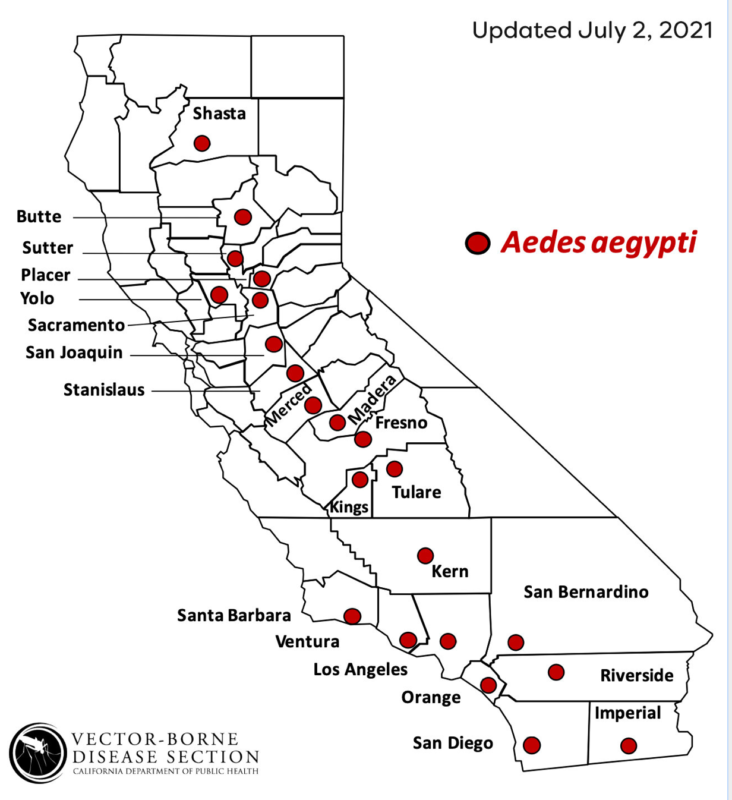Buoyed by its success in the Florida Keys, Oxitec Ltd. is now looking to California to test its program for controlling mosquito pests through genetic engineering, rather than insecticides.
The field research is intended to show that genetically modified (GM) mosquitoes are a viable alternative to spraying insecticides in a bid to control a disease-carrying species of mosquito. Due to climate change, the invasive Aedes aegypti mosquitoes are spreading into new regions throughout the Western United States, including more than 300 cities and towns across California. Aedes aegypti transmit dengue, Zika, heartworm and other diseases, many of which have no treatments or vaccines.

The project employs Oxitec’s proprietary “Friendly” technology, which uses a mini-capsule to hold the eggs of GM Aedes aegypti male mosquitoes. When placed in a small box of water, the capsule releases the males, which then disperse to mate with wild-type female Aedes aegypti in an area of up to two or more acres. Because the non-biting males contain a self-limiting gene, the offspring they produce do not live to maturity, thus naturally suppressing the population.
The technology has been successfully tested in Brazil. The US Environmental Protection Agency (EPA) granted Oxitec permission to conduct its first US pilot program in Florida, which began this past April and is now in its second phase. The company said that mosquito control districts in northern, central and southern California subsequently expressed interest in the technology, prompting Oxitec to apply to the EPA for authorization to expand the areas of its Friendly pilot project.
The application has been endorsed by some veterinarians and conservationists in California, who see the technology as a welcome alternative to the widespread use of insecticides that can kill pollinators.
“I support efforts to reduce invasive species in an environmentally-sustainable way,” said Kevin Bolsajian, co-founder of the Marian Wilson Butterfly Garden, in a press release from Oxitec. “Having innovative mosquito control techniques in California that protect the health of butterflies is very important and I appreciate the environmental benefits of Oxitec’s technology.”
Dr. Mark van der List, a veterinarian and beekeeper, agreed. “Invasive mosquitoes are becoming an increasing threat in California from both a veterinary and human health perspective. As a veterinarian, I appreciate efforts to reduce Aedes aegypti mosquitoes, which are capable of transmitting heartworm disease in animals. In my free time, I enjoy keeping bees and tending to their hives. As we collectively work to protect the health of pollinators, I support innovative mosquito control techniques that are environmentally sustainable.”
Chris Barker, associate professor at the University of California, Davis School of Veterinary Medicine and co-director of the Pacific Southwest Center of Excellence in Vector-Borne Diseases, noted that the state is now experiencing a spread of invasive mosquitoes that breed in backyard habitats that are hard to manage through traditional control methods like spraying.
As previously demonstrated in the Brazil trial, the Friendly capsules can easily be deployed in such areas, controlling localized outbreaks.
The pests are also showing resistance to commonly used insecticides, limiting the effectiveness of that approach.
“It’s critical that mosquito control and public health experts have access to cutting-edge technology so that they can stay ahead of the curve and prevent mosquito-transmitted disease outbreaks,” Barker said.
If Oxitec wins approval from the EPA and California regulatory agencies, it will work with interested mosquito control agencies to determine the location, size and scope of a pilot program or programs. Extensive community education and public outreach efforts will be conducted.
“Mosquito control agencies are interested in learning more about innovative technologies to determine if they are a viable option in protecting the public from disease-transmitting mosquitoes,” said Truc Dever, president of the Mosquito and Vector Control Association of California. “We support Oxitec bringing their non-biting male Friendly Aedes aegypti mosquitoes to California so that we can assess the efficacy and control potential of their technology.”
Image: Water is added to a box containing the Oxitec “Friendly” mini-capsules to prompt the eggs of self-limiting male mosquitoes to hatch. Photo: Oxitec.
